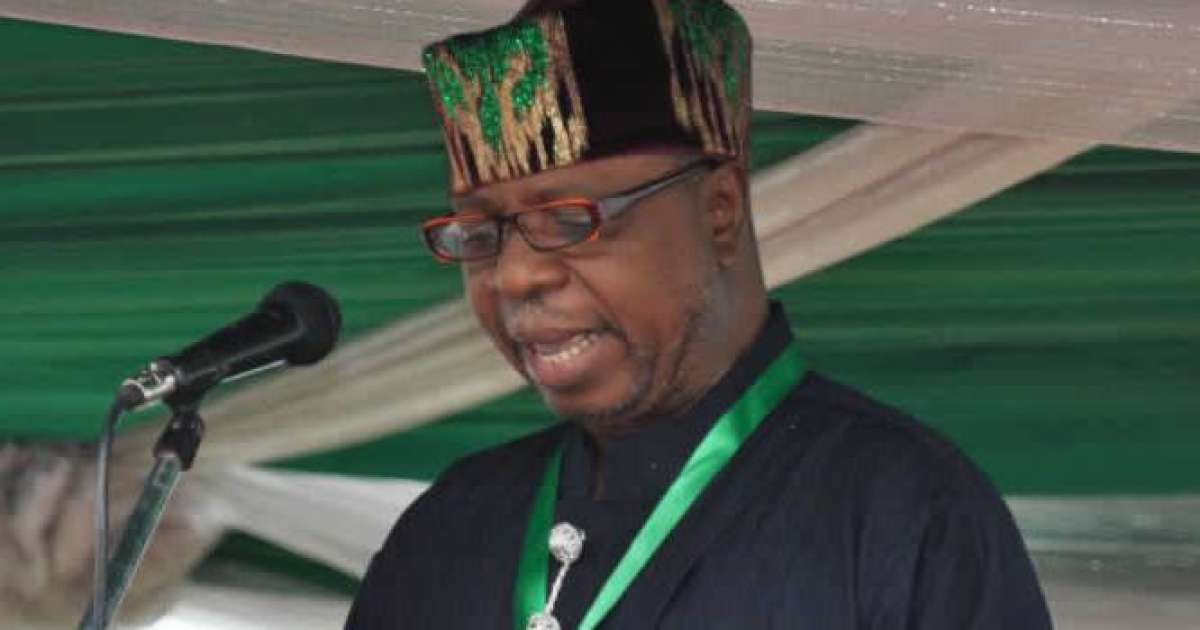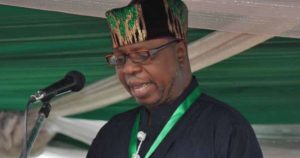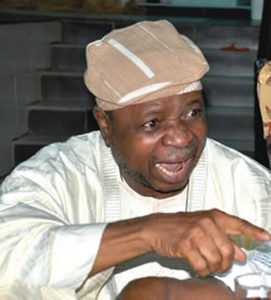EBENEZER BABATOPE: Awoism, Abacha Days & Life at Old Age

 EBENEZER BABATOPE:
EBENEZER BABATOPE:
AWOISM, ABACHA DAYS & LIFE AT OLD AGE
On 26th January 2017, Chief Ebenezer Babatope will become 74 years old. The elderstate’s man in this interesting interview he had with National Mirror when he clocked 70, captioned “Ebenezer Babatope at 70: What I learnt from Awolowo”, he talked about his experience in life, his political family, his bosses; late chief Obafemi Awolowo and Sani Abacha alongside other interesting topics.
Enjoy the interview…
Chief Ebenezer Babatope (OFR) is a former Minister of Transport. He is at present a Peoples Democratic Party (PDP) chieftain. Chief Babatope who clocked 70 years yesterday, speaks about his life and the state of the nation in this interview with Ayo Esan. Excerpts:
How was your background like?
It was like any other background any youth would have passed through. My father was a clergyman. I grew up in the Methodist Mission House and my father ensured that he impacted Christian education on us. I have never felt sorry that my father was a clergyman.
When you were growing up, defi nitely you must have somebody that you were looking up to. Who is your role model?
It was obvious that my role model was Papa Obafemi Awolowo when you talk about Nigeria. When you talk in terms of Africa, Kwame Nkrumah of Ghana was my role model. When we were in secondary school, then I added Professor Wole Soyinka. We all loved his way of doing things, especially his fight for the rights of the oppressed people of Nigeria.
But Papa Awolowo was definitely my role model. I met Papa Awolowo at the age of 11 in 1954, at Ifaki when he came to address a political gathering. The Action Group members in the city then organised a reception for him and as a young star I was delighted to see Papa Awolowo the way he was marshalling out his points. I said God Almighty should make me to be somebody like Awolowo. When I was in secondary school too, my principal who is dead now, came to the classroom one day and asked what would be our life ambition as students. I remember saying to everybody that my ambition was to be the political secretary of Papa Awolowo. Twenty years after that time, I became the Director of Organisation of the party he led, the Unity Party of Nigeria (UPN).
You said Chief Awolowo was your role model and in 1978 you became the Director of Organisation of the UPN, an indication that you were very close to him when he was alive. How would you describe him?
Papa Awolowo was a wonderful, great and highly disciplined person. He impacted knowledge on all his associates and all those who took him as their leader. He was exceptionally disciplined and exceptionally programmed. When he woke up between 4.30 a.m. and 5.00 a.m., he would have itemised what he wanted to do for the whole day. And he would achieve it. Apart from that, when it came to food items, Papa ate very little breakfast; he didn’t take lunch at all but in the evening he was there for his dinner or supper. The average number of hours he would spend on table for his supper would be three hours. This is because he believed that the food was important enough to be respected. That is why I have told people that even if the president of America came to visit Awo without giving his notice of coming during his dinner Papa would beg him to give him time to finish his food. He would spend three hours. He enjoyed taking his Ovaltine and honey. When you see Papa stirring his honey and Ovaltine, you would love to be a part of it. No food of Papa Awolowo contained pepper. But those of us who were his associates, Segun Osoba and the rest of us, I mean Papa had these three journalists that he called the three Musketeers: Segun Osoba, Felix Adenaike and Peter Ajayi, who is dead now. They always took part with Papa in dinner. Then our leaders, Chief Ayo Adebanjo, the late Chief Bola Ige, Olanihun Ajayi and later Abraham Adesanya, all would also take part in the dinner and so many other leaders usually joined Papa at dinner table. He was always very serious with his dinner. All of us would take Mama’s soup because it contained pepper and Papa would not take it because he didn’t eat pepper.
Apparently he was a different person, and he was a stickler for time. If you invited Awolowo for a function and it is to start at 1 o’clock, by five minutes to 1 o’clock, Papa would be there. If you are not ready after 20 to 25 minutes, Papa would leave. He was highly disciplined. He wrote great books out of a disciplined mind. My March Towards Prison was written and then there was the volume 2, Travails of Democracy. The other was Adventures in Power. He couldn’t complete the third one which could have been titled For the Good of the Man. You cannot do this without being a disciplined person. I thank God for giving me the opportunity to serve under him because my life has been enriched with what I have been taught by the life and times of Papa Awo.
You came into politics at a young age and you have remained in it till now. Looking at your participation in politics, do you have any regrets?
I have no regrets at all. I have no regret for being a radical activist, a student leader, a trade union leader and whatever. I thank God for what He has made me to be. Even when Obasanjo as the military Head of State dismissed me from service alongside my other friends, I wouldn’t say so. Edwin and Benedicta Madunagwu, husband and wife; Comrade Ola Oni, Professor Bade Onimode, Professor Obafo Onoge. Ola Oni, Onoge and Onimode, they have died, we were all sent out of the university system. I also went to detention three times, twice under Gowon and the third time under Buhari. The one under Buhari took me 21 months to complete. Why must I regret because apparently that is part of the nature of being in a political struggle.
Looking back, in the last 70 years, which day would you describe as memorable?
Many days are memorable to me but the day that Nigerians voted for MKO Abiola as president even though the result was not released, was a very good day for me. I looked at the past and said so Nigeria could be this? In the First and Second Republic, you could not imagine that someone from outside the North would be voted for to be president of Nigeria. At a particular time in the history of this country, a feudal cabal in the North believed that Nigeria was simply an extension of their private family compound and so nobody can aspire to national leadership except you are from the North. We ended all the attempts that were made to stop Papa Awolowo from becoming president. If what obtained in 1993 were what obtained when Papa contested election in 1979 and 1983, he would have given this country a good, progressive and visionary leadership that everybody would be proud of. Those things did not happen because the cabal believed that anybody from outside the North must be stopped. But in 1993 they bowed and voted for Abiola. Not only that, even when we had an Abiola/Kingibe Muslim-Muslim ticket, the Christians all over Nigeria closed their eyes to that factor and voted for Abiola/Kingibe believing that was what could best be the match for the governing of Nigeria. Also, the day I became a lawyer and I was admitted and called into the Bar was my happy day.
Conversely, what was your worst day?
It was the day my mother died. I was her pet. She died in my final year in the university, at a young age of 53. I wept because she did very much for me.
You mentioned the issue of 1993 election and the fall out was your participation in the Abacha government as a minister. This was seen as not too good by some people, especially in the South-West. Could you relive what led to that situation?
I have told a lot of story about this. That serving Abacha did not come with the Abiola election in 1993. What happened was that there was a coup that was led by Abacha, Diya, Jeremiah Useni and all of them. They removed Shonekan and then they said they were going to have a government. First it was to be a short term government. They now invited political pressure groups to send in people to join the government. The Obafemi Awolowo political family was contacted. A meeting was held in the late Pa Alfred Rewane’s house in Ikeja Lagos where four of us, myself, Mrs Osomo, Dr Olu Onagoruwa and Alhaji Lateef Jakande, were chosen by the Awolowo group to go into government. When we got to government, certain things developed which in fact militated against those of us who wanted to serve as honest Nigerian citizens and who wanted to represent our political group or political family. So we left government after 14 months and went into our various homes. It has nothing to do with Abiola or no Abiola. The arrest of Abiola which is quite unfortunate and which eventually led to his death was something which was decried by everybody. Even when we were in government we decried it.
When you were young, what was your expectation of a future Nigeria? Would you say what you had in mind then tally with the situation the country is now?
I believe that a country does not die economically. The only punctuation mark I have is that Nigerians have not learnt a lesson from the Nigeria-Biafra war. When I was in the university, I was exceptionally pro-Biafra. I was pro-Biafra because I felt that, like I said earlier, a group of people never believed that Nigeria must have a southern leadership. Every little thing that happened was interpreted in the manner of North, South and then with advantage to the North. There was a time the North was absolutely in control of the Military. We felt it was wrong and that is why many of us at that time as undergraduates joined in the struggle to have Nigeria as a confederal state. Now things are changing, even though you can see some people trying to rewrite Nigerian history, I want to advise Nigerians, particularly the youth, that they must ensure that what is operating now remains with Nigeria. That is, any person born of a woman can be leader of Nigeria. The moment Nigeria changes from that then the country is finished.
Some people believe that being an associate of the late Chief Awolowo who was known for his liberalism or a progressive, your choice of PDP which is regarded as conservative was wrong. How will you react to this?
I have told many of my friends, including journalists who had interviewed me, that no political party in Nigeria, can say it is a progressive or an ideological based party. Not one or a single party. Don’t forget that the late Chief Bola Ige wrote the manifesto of all major political parties in the country today. Apparently, there is nothing you can charge PDP for as being conservative that you can’t charge the ACN or CPC or you can charge the ANPP. Precisely, we should be praying that one day, Nigerians will turn to what we had in the First and Second Republic when there were ideologically oriented political parties. Right now there is none. Many of my colleagues in ACN are still my friends. For instance, it is difficult for me now at the age of 70 to start jumping ship. What lessons or examples are we giving to the younger people? That we are jumping from the PDP to this or that party. It is arrant nonsense. If I leave the PDP today, I will retire to my house and play my domestic politics very well, eat my pounded yam, which is typical of Ijesha people and then wait for when God would say I should come homeI tell you that no party is ideological except we are deceiving ourselves. There is no progressiveness in any political party. There are individuals in these parties who are progressives, you can’t deny them. You cannot say Segun Osoba, Bola Tinubu, the late Lam Adesina, Bisi Akande are not progressives. They too cannot say that Babatope, Tunde Adeniran, Martins Kuye, Senator Omilani, Olu Alabi, Dayo Abatan, and Yemi Faroumbi are not progressives and we are all in the PDP. They cannot also say that Professor Jerry Gana who came from a progressive tradition to become senator in the second republic is a reactionary or Solomon Lar who was governor of the NPP and was the pioneer chairman of the PDP is a reactionary. These are people of progressive bent.
Unlike in the Second Republic our political parties now lack clear cut programmes and manifestoes. What has that to say about our democracy?
We are getting to that stage now, because Nigerias are now asking questions and that is very important. Look at all elections that had been held after 2011. In those elections people have been asking questions. They have risen to let everybody know that they are aware of what is going on and are going to vote according to their conscience. Look at how the people of Ondo State rose up to vote for Mimiko because they recognised that Mimiko was doing the right thing, he was doing well. He was executing programmes that would enhance the people’s welfare. Go to Akure and see the wonders that that young man has performed. With Nigerians becoming highly politically conscious and are asking questions, you find out that we are going to have a situation very soon when we will have issue-oriented political parties. That is what we are waiting for and that is what we are going to get.
What do you think is really the problem with the country?
There are many things that are wrong with Nigeria. As I said in the past, we didn’t have correct political leadership as a result of that cabal that I talked about. Secondly, we have a situation where people are so self contented that they forget things too easily, especially the intellectuals. Something that happened yesterday is quickly forgotten today, so history is being subverted. If we are able to ensure that we live up to the yearnings of Nigerians who have the power ultimately, the country will not have problems. But unfortunately we are not doing it. Look at the National Assembly, the Senate is doing very well. I love what those lawmakers are doing. I am not saying the House of Representatives is doing badly but for God’s sake, the House of Representatives should stand up and convince Nigerians that the Farouk matter is not just being made to fade away. I am not saying they should punish Farouk but they must get at the bottom of the issue and take decision that will make Nigerians to love them.
You said you were happy when a southerner for the fi rst time won the presidential election in 1993. Now a southern minority, Goodluck Jonathan, is the President of Nigeria. How will you assess his government?
Jonathan’s government has not done anything which is criminal. His government has done things which I believe have been within the normal pattern of what we have been seeing in Nigeria since independence. Jonathan is thriving, I can say that, not because we are from the same political party. If he was not doing well, I thank my God, I will take my biro and write a letter to him. But believe me the young man is doing his best. The man is trying his best. Nigeria is a difficult country to govern politically. In Nigeria because of the volatility of politics, people are prepared to sacrifice and crucify a ruler who is unable to prove to them why the action that ruler is taking has become necessary. Jonathan is trying and where there are lapses he should cover up. For example, he said something recently, that this year the government will do everything to ensure it meets the hopes and aspirations of Nigerians. That is good enough. That is a clear-cut statement by him that things are not going on well. He wants to correct them and so we should give him all the encouragement to do it. We should wish him the best of luck.
There was a time you aspired for the office of secretary general of your party. At the convention ground you were manoeuvred and schemed out. How do you feel about that development?
I don’t feel bad about it. One thing we should talk about is that the party at that time surrendered to policies and programmes that were not in consonance with party supremacy and also with internal democracy. We have learned our lessons and we have made up our mind that we would correct all those things. For example, it wouldn’t happen again in PDP that there will be imposition of candidates. It won’t happen again and everybody is doing his best to ensure that imposition does not happen again. We have forgotten about the issue of secretaryship and we are looking forward. God is the one that sees the future
What about the crisis in the PDP both in the South-West and at the national level?
I don’t see the PDP as being in crisis. You see the PDP might have situations that appear ugly but the joy that some of us have is that the party recognises this factor and makes sure that it announces committees that will study the problems and ameliorate them…like we had the General Ike Nwachukwu committee of which I was a member to look at the party operation in the country and recommend what the party should do. We went to many parts of the country to give that advice and today we were able to discover in Kaduna that there was a man called Sambo, who is brilliant politically and is now vice-president of the country. Whenever Makarfi presents a political solution to you, you will know that it comes from a mature and brilliant mind. He is doing very well in the Senate. It is a pity Yakowa died and it was apparent that he was a civil servant but Yakowa would only talk when talking was necessary. What I am saying is that in PDP, we have been able to have committees that will be able to determine the way forward for the party and solve what you called crisis. If an individual thinks he can cause crisis then he is deceiving himself because the party will go behind him, continue to live without him and he would regret that he had ever been caught in a game that is not productive to party supremacy.
Now that you are 70, what should Nigerians expect from you on the political front?
It is true I am 70 and have joined the group of septuagenarians, I am very happy about that. Again it won’t stop my radical activities. I definitely will continue to be a member of the PDP. I am going to continue my column in Nigerian Tribune, Political Panorama which the Tribune management has kindly given to me and which I have been writing for several years. I will continue to be myself and speak the truth. If tomorrow an ACN governor dwarfs other governors in Nigeria, I will not destroy him. I will hail him. When Fashola, in his first term, was doing very well in Lagos, I wrote many times in my column what the man was doing. I will do so to any politician of other school of thought other than PDP.
